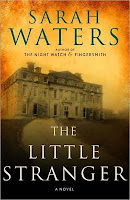My
Rating: 4.0 / 5.0
AmazonRating: 3.60 / 5.00
Goodreads
Rating: 3.45 / 5.00
I read
this book as part of a Read Along organized by The Estella Society as part of
the R.eaders
I.mbibing P.eril VII Challenge at Stainless Steel Droppings.
Hundreds
Hall is just outside the small town of Lidcote in Warwickshire, England. When
he was a young boy, Dr Faraday caught a rare glimpse of the splendor inside,
something that he would never normally see because he was the son of one of the
maids. He became entranced by the house and its occupants, the Ayres family.
Many years later, World War II has been cruel to the landed gentry and Hundreds
is now in rapid decline. Now one of the local doctors, Faraday is called to the
Hall to see a sick maid, and is horrified by the state of the house and its grounds.
As he
becomes a trusted friend of the family, he is present when a very strange event
occurs, injuring the daughter of the local nouveaux riches. While he can find
perfectly normal reasons to explain away this tragic accident, it becomes increasingly
obvious that otherworldly forces are acting upon the Hall and its inhabitants.
This is
the first time I have read one of Sarah Waters’ books, but I can understand why
it was a finalist for the Man Booker Prize. The writing is excellent and
evocative, recreating the social climate in the period just after World War II
very well. We forget now that the War brought a huge change in the social
structure of Great Britain. The landed classes could no longer maintain their
lifestyle because of stringent tax reforms introduced by the post-War labor
government, but also because the working class were no longer happy to take
live-in employment with the associated minimal freedom. So, robbed of both
their servants and the money required to maintain their estates, many families
sold off their land for housing developments or opened their homes and / or
grounds for the newly mobile public.
The first
quarter or third of the book is used to introduce the main players in our
story. Dr Faraday is a rather adventurous, forward-thinking man of science,
willing to try new techniques and apply new knowledge. However, he is barely
making a living, because so many of the locals do not trust a doctor from a
working class background and prefer to use one of his competitors, and also
because he has so much debt from his long years of training. He has no true
place in society because he is rejected by both classes: the working class
think he has risen above his station whilst the landed class see him as an
upstart. He is intensely lonely.
The Ayres
are also social outcasts, but in their case it is because they cannot continue
their role in local life. They are reduced to employing only one maid and a
part-time cook and can barely heat the Hall through the winter. The building is
slowly collapsing around them and the grounds are a mess. Even their farm is
falling behind the times because they cannot afford to install the electric
milking machines needed for them to sell their milk. Mrs Ayres tries to
maintain an air of gentility, although she is still grieving the deaths of her
husband and her young daughter, Susan, almost thirty years ago. Caroline Ayres
is not pretty enough to attract a wealthy husband and has spent the last few
years nursing her brother Roderick, who was horribly disfigured by begin burnt
during the war. Caroline yearns desperately to be free of the Hall and to lead
her own life, while Roderick is consumed with the responsibility of being the
man of the house, trying to keep the family afloat financially. When we first meet
them the Ayres are just about keeping things together, but this is a fragile
illusion.
Of
course, there is an event that causes the family members to begin to unravel,
each becoming increasingly obsessed with their own particular demons. This
leads both Mrs Ayres and Caroline to become more dependent upon Dr Faraday, a
role that he relishes. However, his insistence upon rational explanations for
all the things that they experience actually makes matters worse and leads to
the most tragic outcome imaginable. This makes him a very unreliable narrator,
and by the end of the book I found him really rather unpleasant and selfish in
his persistent need to maintain the lie that nothing was wrong at the Hall. His
desire to keep his position as a friend of the family was horribly tangled with
his need for acceptance and he became blind to anything that would allow the
future to deviate from his vision. In many ways he is the ‘Little Stranger’ of
the title, insinuating himself into the family and the bringing nothing but
grief and horror.
The
horror itself is very well done. The dilapidated house is almost cliché, with
its squeaky doors and flapping curtains, but the writing is so good that the
atmosphere is entirely believable and very chilling. The supernatural elements
are kept to a minimum and yet there are touches that will make the hair stand
up on the back of your neck. However, many of the most horrific things are done
by real, living people, and they will make you very uncomfortable as well.
Other Reviews I Recommend:



No comments:
Post a Comment
Please let me know what you think, because comments make me happy!
Note: Only a member of this blog may post a comment.